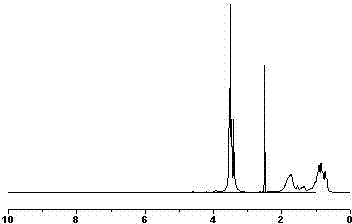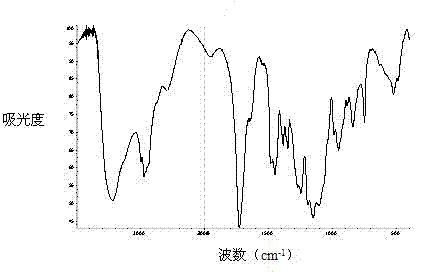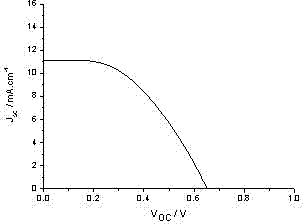Micro-branched polymer gel electrolyte and preparation method thereof
A gel electrolyte and polymer technology, applied in capacitor electrolyte/absorbent, circuit, photosensitive equipment, etc., can solve the problems of battery packaging difficulties, dye desorption, solvent volatilization, etc., and achieve good electrochemical stability and interface resistance Effects of small, mild operating conditions
- Summary
- Abstract
- Description
- Claims
- Application Information
AI Technical Summary
Problems solved by technology
Method used
Image
Examples
preparation example Construction
[0036] The preparation method of micro-branched polymer gel electrolyte is through micro-branched P(A-BIS) / PEG polymer and redox pair iodide / I 2 The mixed reaction forms the microbranched polymer gel electrolyte of the present invention. Specifically, the preparation method of the present invention comprises the following steps:
[0037] Step 1: Preparation of Microbranched P(A-BIS) / PEG Polymer
[0038] The reaction bottle is respectively connected with condensed water, mechanical stirring and flowing nitrogen. Firstly, polyethylene glycol, cross-linking agent N,N-methylenebisacrylamide BIS and solvent are added to the reaction bottle, and acrylate monomers such as methyl Methyl acrylate MMA, methyl acrylate, butyl acrylate BA, hydroxyethyl methacrylate, hydroxypropyl acrylate, fluoroheptyl acrylate, fluoroheptyl methacrylate, MAA methacrylate, acrylic acid in solvent ; Dissolve the initiator in tetrahydrofuran, flow nitrogen gas, raise the temperature to 50~90°C, slowly dro...
Embodiment 1
[0060] Step 1: Preparation of P(A-BIS) / PEG polymer
[0061]The reaction flask was respectively connected with condensed water, mechanical stirring and flowing nitrogen gas. Firstly, 8.58 g of polyethylene glycol, 0.04 g of cross-linking agent N,N-methylenebisacrylamide BIS and 10 g of tetrahydrofuran were added to the reaction flask. MMA 13g, BA 1g, and MAA 6g were dissolved in 25 g of solvent; 0.2 g of initiator azobisisobutyronitrile was dissolved in 5 g of tetrahydrofuran, and the temperature was raised to 70°C by flowing nitrogen gas, and the acrylate monomer The solution and the initiator solvent were slowly dropped into the reaction flask at the same time, and reacted for 24 h.
[0062] In this embodiment, the mass ratio of the monomer MMA:BA:MAA:crosslinker BIS:initiator AIBN:PEG:solvent is 1:0.07692:0.4615:0.003077:0.01538:0.66:3.077. The molecular formula of polyethylene glycol PEG is HO-(CH 2 CH 2 O) n H, n stands for CH 2 CH 2 The average value of the number o...
Embodiment 2
[0086] Step 1: Preparation of P(A-BIS) / PEG polymer
[0087] The reaction flask was respectively connected with condensed water, mechanical stirring and flowing nitrogen. Firstly, 8.58 g of polyethylene glycol, 0.005 g of cross-linking agent N,N-methylenebisacrylamide BIS and 5 g of tetrahydrofuran were added to the reaction flask, and the acrylic acid Ester monomers MMA 13g, BA 1g, and MAA 6g were dissolved in 12.5 g of solvent; 0.2 g of initiator azobisisobutyronitrile was dissolved in 2.5 g of tetrahydrofuran, flowed nitrogen, and the temperature was raised to 70°C, and the acrylate monomer The solution and the initiator solvent were slowly dropped into the reaction flask at the same time, and reacted for 24 h.
[0088] In this embodiment, the mass ratio of monomer MMA: BA: MAA: crosslinking agent BIS: initiator AIBN: PEG: solvent is 1:0.07692:0.4615:0.00038:0.01538:0.66:1.538. The molecular formula of polyethylene glycol PEG is HO-(CH 2 CH 2 O) n H, n stands for CH 2 C...
PUM
| Property | Measurement | Unit |
|---|---|---|
| electrical conductivity | aaaaa | aaaaa |
Abstract
Description
Claims
Application Information
 Login to View More
Login to View More - R&D
- Intellectual Property
- Life Sciences
- Materials
- Tech Scout
- Unparalleled Data Quality
- Higher Quality Content
- 60% Fewer Hallucinations
Browse by: Latest US Patents, China's latest patents, Technical Efficacy Thesaurus, Application Domain, Technology Topic, Popular Technical Reports.
© 2025 PatSnap. All rights reserved.Legal|Privacy policy|Modern Slavery Act Transparency Statement|Sitemap|About US| Contact US: help@patsnap.com



